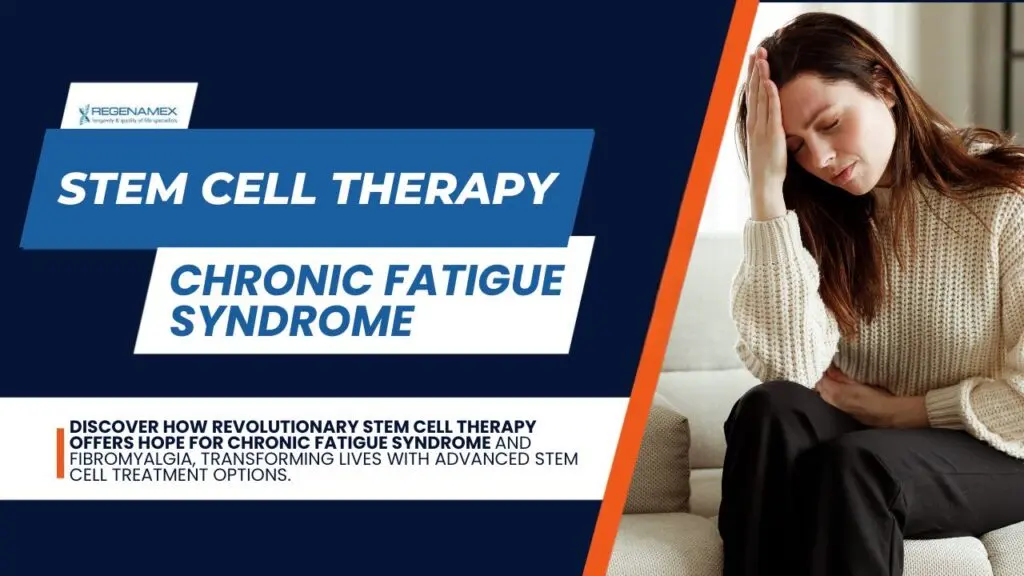
Unlocking hope for patients suffering from chronic fatigue syndrome (CFS) and fibromyalgia involves innovative approaches like stem cell therapy. Recent research articles suggest that cell therapy for chronic fatigue can potentially help reduce fatigue and improve the overall well-being of patients with chronic fatigue. By harnessing the power of stem cell treatment, scientists aim to reprogramme cells to alleviate symptoms associated with these debilitating health conditions.
Both patients with fibromyalgia syndrome and those with CFS often experience overlapping symptoms, making the treatment of fibromyalgia and the treatment of chronic fatigue particularly challenging. However, the use of stem cells presents a promising avenue for effective treatments for chronic fatigue and related disorders. By exploring this cutting-edge therapy, researchers hope to unlock new possibilities that can significantly improve your quality of life and address a variety of conditions impacting healthy controls and patients alike.
Understanding Chronic Fatigue Syndrome (CFS)

Chronic Fatigue Syndrome (CFS) is a complex and debilitating condition characterized by persistent and unexplained fatigue that is not alleviated by rest, lasting for at least six months. It affects various bodily systems and often coexists with symptoms such as muscle pain, cognitive difficulties, and sleep disturbances.
CFS is estimated to affect millions worldwide, with varying prevalence rates reported across different studies and regions. It predominantly affects adults, particularly those in their 40s and 50s, and is more common in women than men.
The exact causes of CFS remain unclear, but several factors are implicated in its development. Immune dysfunction, including abnormalities in immune response and chronic inflammation, plays a significant role. Viral infections, such as Epstein-Barr virus and enteroviruses, are often linked to the onset of CFS in some individuals. Genetic predisposition may also contribute, with certain genetic variations potentially increasing susceptibility.
Triggers such as physical or emotional stress, trauma, and hormonal imbalances can exacerbate symptoms or trigger the onset of CFS in predisposed individuals. These triggers often interact with underlying vulnerabilities to perpetuate the chronic nature of the condition.
Common symptoms of CFS include:
Chronic fatigue: Overwhelming tiredness that persists despite rest and sleep.
Muscle pain: Aching muscles or joints, often described as widespread and persistent.
Cognitive dysfunction (brain fog): Difficulty concentrating, memory problems, and impaired mental clarity.
Sleep disturbances: Unrefreshing sleep, insomnia, or disrupted sleep patterns.
The impact of CFS extends beyond physical symptoms to affect daily activities, such as work, school, and social interactions. Emotional well-being can be severely compromised due to the unpredictability of symptoms and the challenges in managing the condition. Overall, CFS significantly reduces quality of life, causing frustration, isolation, and dependency on others for daily tasks.
Benefits of WJ-MSC Therapy for CFS

Expanded Wharton’s Jelly Mesenchymal Stem Cells (WJ-MSCs) play a crucial role in modulating the immune response in CFS patients. These stem cells possess potent immunomodulatory capabilities that help restore immune balance and reduce chronic inflammation associated with CFS. By interacting with immune cells and releasing anti-inflammatory cytokines, WJ-MSCs mitigate immune dysfunction, thereby alleviating symptoms and promoting overall health improvement.
WJ-MSCs contribute to cellular repair and renewal, addressing underlying cellular dysfunction and oxidative stress observed in CFS. Through their regenerative properties, these stem cells promote tissue repair and enhance cellular function. By targeting damaged tissues and promoting cellular regeneration, WJ-MSC therapy holds promise in reducing fatigue and improving physical stamina in CFS patients.
Beyond immune modulation and tissue repair, WJ-MSCs offer neuroprotective benefits that are particularly relevant for CFS patients experiencing cognitive dysfunction (brain fog) and memory issues. The release of growth factors and neurotrophic factors by WJ-MSCs supports neuronal health, potentially enhancing cognitive function and mental clarity. This aspect of therapy aims to alleviate cognitive symptoms and improve overall brain function in individuals with CFS.
WJ-MSC therapy for CFS comprehensively aims to improve both physical and emotional well-being. By addressing immune dysregulation, promoting cellular regeneration, and supporting neuroprotection, this therapy contributes to a significant enhancement in quality of life for patients. Reductions in fatigue severity, improvements in daily functioning, and enhanced emotional resilience are among the observed benefits. Patient testimonials and case studies underscore the positive outcomes and transformative impact of WJ-MSC therapy on the lives of individuals managing CFS.
Personalized Treatment Approach at Regenamex
At Regenamex, WJ-MSC therapy for Chronic Fatigue Syndrome (CFS) is meticulously tailored to address the unique symptoms and medical history of each patient. Our approach begins with a thorough assessment of the individual’s condition, including the severity of fatigue, associated symptoms like muscle pain and cognitive difficulties, and any underlying health factors. Based on this comprehensive evaluation, a personalized treatment plan is developed to optimize therapeutic benefits. This personalized approach ensures that each patient receives targeted care aimed at improving their specific symptoms and enhancing overall well-being.
Regenamex upholds stringent ethical standards in the sourcing of WJ-MSCs. These stem cells are obtained from carefully screened and ethically obtained tissue donors, adhering to established guidelines for ethical procurement practices. The umbilical cord tissue is sourced from consenting donors following stringent ethical and regulatory protocols to ensure safety and efficacy. This commitment to ethical sourcing underscores Regenamex’s dedication to maintaining the highest standards of integrity and transparency in regenerative medicine.
WJ-MSC therapy at Regenamex offers a favorable safety profile compared to traditional symptomatic treatments for CFS. The procedure is minimally invasive, involving the administration of WJ-MSCs via targeted injections or infusions, which are well-tolerated by patients. Clinical trials and research studies have demonstrated the safety and tolerability of WJ-MSC therapy, with minimal risk of adverse effects or complications. This non-surgical approach reduces the risks associated with invasive procedures and long-term medication use, offering CFS patients a potentially safer and more sustainable treatment option. Moreover, the long-term benefits of WJ-MSC therapy may include sustained improvements in symptoms and overall quality of life for patients undergoing treatment at Regenamex.
The Science Behind WJ-MSC Therapy

Expanded Wharton’s Jelly Mesenchymal Stem Cells (WJ-MSCs) exert their therapeutic effects through multifaceted mechanisms at a cellular level. Firstly, WJ-MSCs possess potent immunomodulatory properties, which play a crucial role in regulating the immune system dysregulation often observed in CFS. By modulating immune responses, WJ-MSCs help restore immune balance, reduce chronic inflammation, and alleviate autoimmune responses that may contribute to CFS symptoms. Secondly, these stem cells promote cellular regeneration and repair. They release growth factors and cytokines that stimulate tissue healing, repair damaged cells, and support the regeneration of tissues affected by oxidative stress and cellular dysfunction associated with CFS. Lastly, WJ-MSCs offer neuroprotective effects by producing neurotrophic factors that support nerve cell survival, enhance neuronal function, and potentially mitigate cognitive impairments such as brain fog experienced by CFS patients.
The efficacy of WJ-MSC therapy for CFS is supported by a growing body of scientific research and clinical trials. Studies have demonstrated that WJ-MSCs effectively modulate immune responses and reduce inflammation, leading to symptomatic improvements in CFS patients. Clinical trials have highlighted significant reductions in fatigue severity, pain levels, and cognitive impairments following WJ-MSC therapy. These findings underscore the therapeutic potential of WJ-MSCs in addressing the underlying mechanisms of CFS and improving patient outcomes.
When compared to traditional treatments for CFS, such as medications (e.g., pain relievers, antidepressants) and cognitive behavioral therapy (CBT), WJ-MSC therapy offers several distinct advantages. Firstly, WJ-MSC therapy targets the root causes of CFS at a cellular level, rather than merely managing symptoms. This approach may lead to long-term improvements in disease progression and symptom management, as opposed to symptomatic relief provided by medications. Secondly, WJ-MSC therapy is minimally invasive and generally well-tolerated, with a favorable safety profile reported in clinical studies. In contrast, medications for CFS may have side effects and limitations in efficacy, while CBT primarily focuses on coping strategies rather than physiological improvements. Lastly, WJ-MSC therapy has the potential to offer sustained benefits, including enhanced quality of life and reduced reliance on ongoing treatment regimens, compared to conventional approaches that often require continuous medication use or therapy sessions.
Conclusion
In summary, WJ-MSC therapy offers a promising approach for managing Chronic Fatigue Syndrome (CFS) by addressing the root causes of the condition. Through immune system regulation, cellular regeneration, neuroprotection, and overall enhancement of quality of life, WJ-MSC therapy aims to provide comprehensive relief from the debilitating symptoms of CFS. By restoring immune balance, promoting tissue repair, and supporting cognitive function, WJ-MSCs offer a holistic treatment option for individuals struggling with the challenges of CFS.
If you or someone you know is affected by Chronic Fatigue Syndrome, consider exploring WJ-MSC therapy as an innovative and effective treatment option. Consult with our experienced healthcare professionals at Regenamex to discuss personalized treatment plans tailored to your specific needs and medical history. Take the first step towards a better quality of life by exploring the potential benefits of WJ-MSC therapy at Regenamex.
Regenamex is committed to advancing regenerative medicine through the use of Expanded Wharton’s Jelly Mesenchymal Stem Cells (WJ-MSCs), offering hope and new possibilities for patients living with Chronic Fatigue Syndrome. Our dedication to ethical practices, personalized care, and cutting-edge research underscores our commitment to delivering exceptional healthcare solutions that make a meaningful difference in the lives of our patients.

